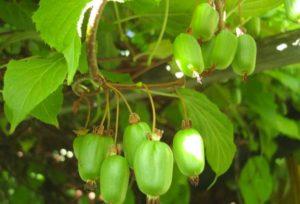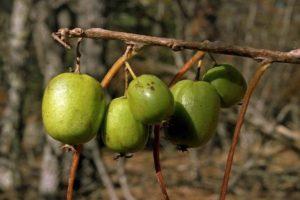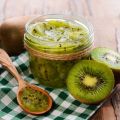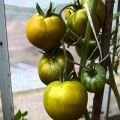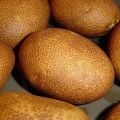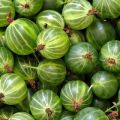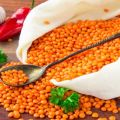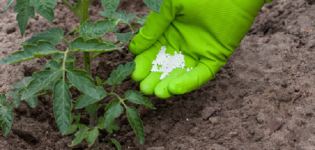The benefits and harms of kiwi for human health and when it is better to eat the fruit, cosmetology recipes
Liana from the genus Actinidia, which grew wild in China, is now cultivated in Japan and Iran, Greece and Italy. Kiwi fruits look like potatoes, their surface is covered with villi, but in the taste of tender green pulp, shades of strawberry, gooseberry and pineapple are surprisingly combined. The sweet and sour berry weighs about 100 grams and serves as a source of a whole range of vitamins and minerals, which are the benefits of the kiwi fruit. Fruits can be harmful if consumed without knowing the measure.
Chemical composition and calorie content
Vine berries are rich in ascorbic acid, which helps to strengthen the immune system, reduces the effects of microbes and viruses.Kiwi contains tocopherol and vitamin A, with a deficiency of which nails break, hair splits.Folic acid is involved in many processes that occur in the human body. Pyridoxine soothes the nerves, improves protein absorption. In small quantities, fruits contain vitamins B1, B2, B 3-5.
The juicy pulp of kiwi contains 9 types of minerals, including:
- iron and zinc;
- phosphorus and sodium;
- potassium and chlorine.
Sulfur acts as an antioxidant, calcium eliminates inflammation, strengthens bones, magnesium has a beneficial effect on the heart.
When kiwi is consumed, the body is saturated with trace elements in the form of boron and copper, aluminum and fluoride.
Iodine normalizes the synthesis of hormones, with a lack of it, the thyroid gland suffers. Manganese is responsible for tissue repair, accelerates wound healing. With a deficiency of molybdenum, and this substance is found both in the pulp and in the skin of kiwi, the development of the cells that make up the tissues of the respiratory organs slows down.

The fruits of the exotic fruit are rich in:
- fiber;
- protein;
- sugars;
- flavonoids.
100 grams of berries contain slightly more than 60 calories, but with the use of such an amount, the human body receives a daily requirement for ascorbic acid and ¼ in potassium.
Features of different varieties
In Russia, an exotic berry is cultivated for industrial purposes in the Sochi region; it is found in the wild in the Far East. A tall plant of the Hayward variety is distinguished by large oval fruits, some specimens weigh 150 grams.Juicy pulp of light green color pleases with delicate taste and aroma.
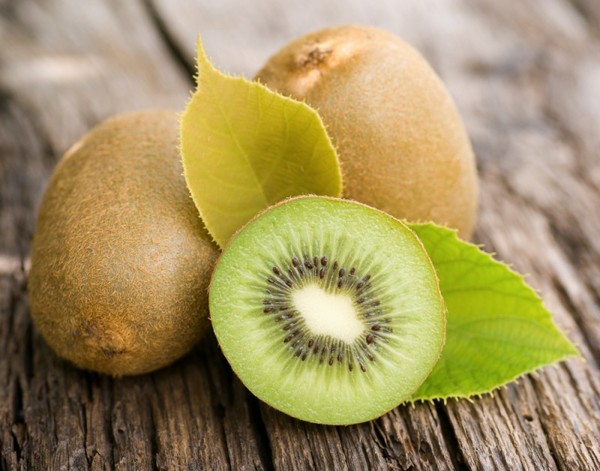
Dessert variety Bruno is rich in organic acids, fruits are perfectly stored for 3 months. On one plant, up to 6 buckets of fruits, covered with brown skin, ripen. The pulp has a yellowish tint.
The Monti variety is distinguished by its round leaves, blooming in early May. The surface of the berries is covered with hairs, each weighing no more than 30 grams. Fruits are poorly transported, do not store for a long time, but the bright green pulp smells like pineapple.
Abbot is valued for its high yield, the first fruits, shaped like a pear, appear already in the fourth year. One plant produces 7 buckets of sweet and sour berries, the average fruit weight is 40 grams. In the Adler region, the Tomuri variety is cultivated, which has male-type flowers and the earlier rapidly growing Matua. They are often used to pollinate other kiwi species.
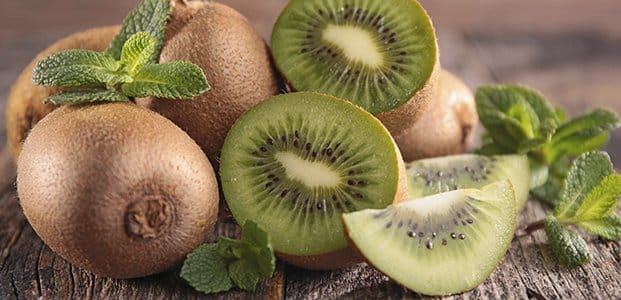
How to choose the right ripe and quality fruit
When buying exotic fruits, you need to carefully look not only at the appearance, but also take into account other signs that suggest which fruit to choose:
- Ripe berry has a weak aroma, the fruit that starts to deteriorate, smells a little wine.
- When overripe, the kiwi becomes soft to the touch, the green fruit seems very hard when pressed.
- The fruits should be evenly colored and the color depends on the variety.
- In a high-quality berry, hairs are well washed off and cleaned.
You should not buy kiwi, which juice is released when pressed, the skin is covered with spots, most likely, they are already rotting.
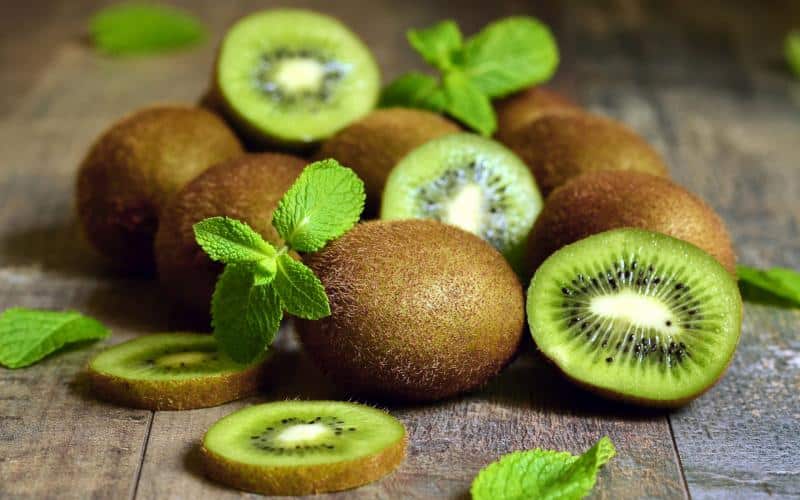
It is better to buy fruits by the piece; spoiled fruits are also packed in baskets, because sellers need to get rid of such a product.
In what form and when is it better to use
Fresh kiwi contains a lot of nutrients that are absorbed faster when the fruit is eaten before meals. When cutting into slices, the concentration of ascorbic acid decreases, it is better to simply peel the fruit and use it as an apple as a whole. Kiwi skins are even healthier, but not everyone can eat it.
Sweet and sour berries are added to salads, used to make jams, desserts, cocktails, baked goods, pickles. They go well with meat and are used in wine production.
Useful properties of the fruit
In terms of the concentration and variety of vitamins and minerals, kiwi surpasses many fruits that are familiar from childhood to people living in temperate climates. The fruits of the Chinese gooseberry are appreciated not only for their unique aroma and sweet and sour taste, but also for the fact that they have a positive effect on almost every body system.
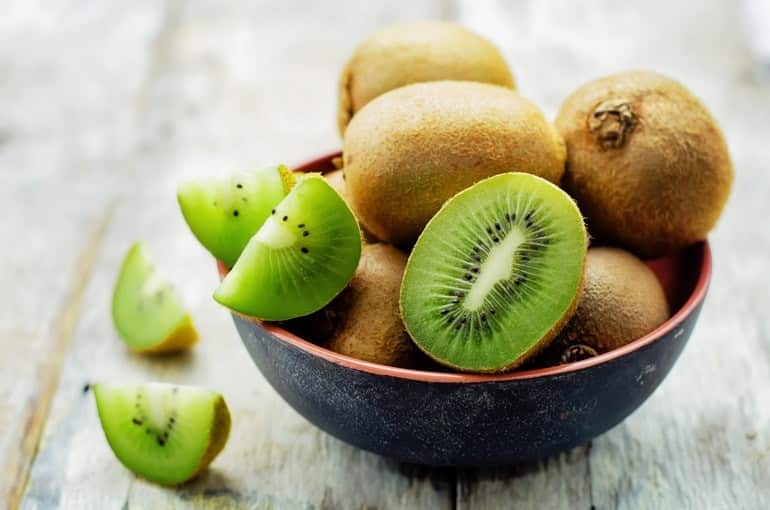
Boosts immunity
Eating just one kiwi per day can prevent colds, protect against viral infections, and it is easier to endure a disease caused by bacteria. Ascorbic and folic acid, vitamins of groups A, E and B, which are rich in fruits, strengthen immunity, restore vitality.
Stimulates the work of the cardiovascular system
The potassium present in kiwi helps to eliminate swelling by removing excess fluid. Magnesium strengthens the walls of arteries and capillaries, helps to reduce pressure. When eating fragrant fruits, blood thinns, the risk of blood clots, the development of atherosclerosis, and acute ischemia decreases. For people suffering from heart pathologies, doctors recommend including kiwi in the diet.
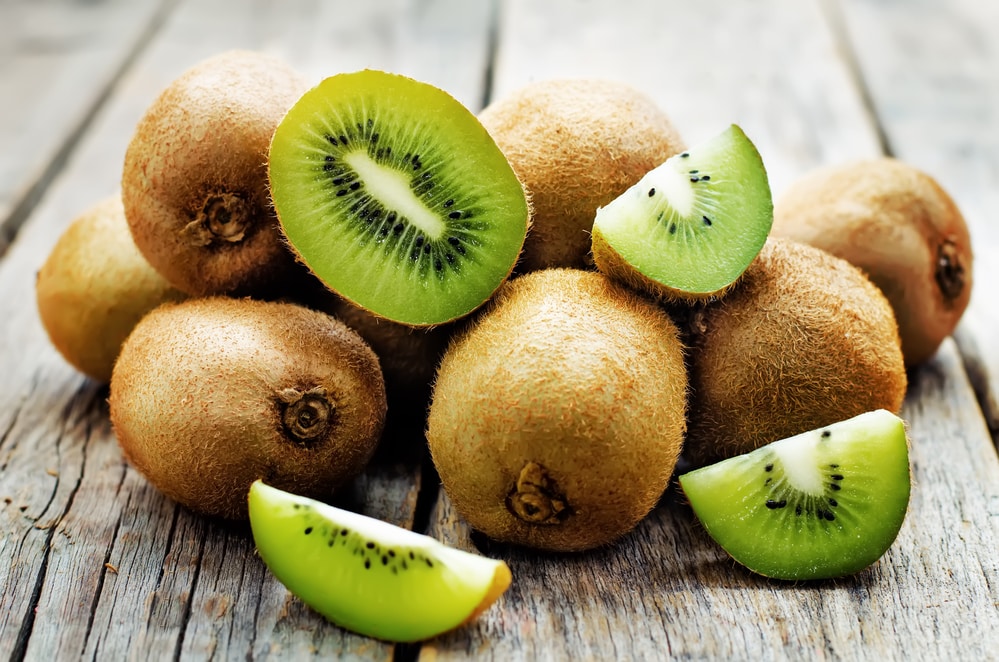
Hematopoietic action
Sweet and sour berry helps to cope with anemia, as it is rich in iron, which increases the amount of hemoglobin. Due to the presence of actinidin, the use of the fruit promotes the breakdown of fats, prevents the formation of blood clots, which occurs when blood clots rapidly.
Weight normalization
To lose extra pounds, you do not have to torment yourself with hunger, you need to eat kiwi instead of sweets.The berry speeds up metabolism, has a laxative effect, contains a lot of fiber, rid the body of fats and toxins. Even if a person eats not one, but several fruits, he will not gain weight, they have very few calories.
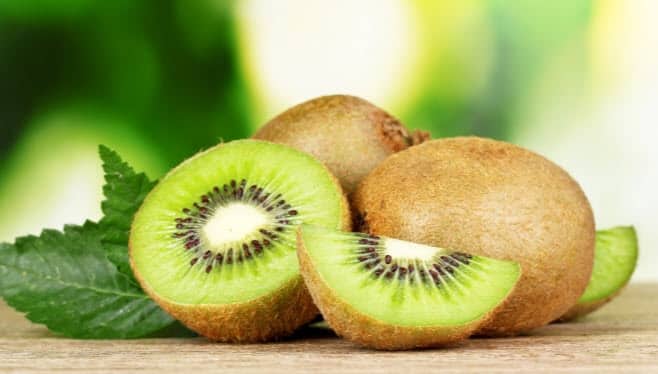
Improving the functioning of the kidneys and the digestive system
Pectins, present in kiwi, restore the intestinal microflora after taking antibiotics, and induce appetite. Fiber improves peristalsis, participates in the secretion of enzymes. With regular use of the fruit:
- The digestion of proteins is facilitated.
- The metabolism is accelerated.
- Bloating, heartburn disappears.
Kiwi helps to eliminate salts and excess sodium accumulated in the body. The fruit prevents the formation of stones, cleanses the kidneys, and they start to work better.
Has a positive effect on the nervous system
Kiwi restores lost sleep, reduces the effects of stress, helps fight emotional stress, copes with bad moods, calms the nerves.
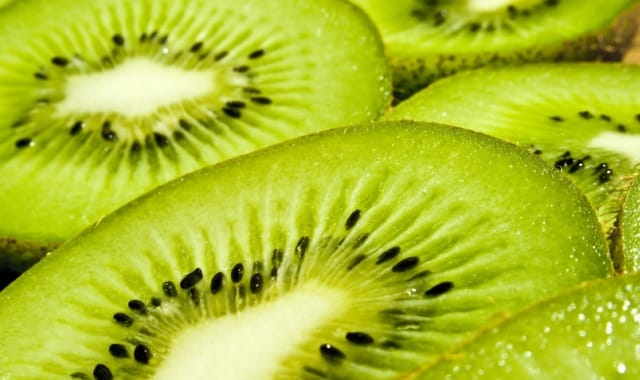
How to prevent cancer
There are many different vitamins in kiwi, and three of them function as antioxidants, inhibit the activity of free radicals involved in oxidative processes and provoking the formation of malignant tumors. Regular consumption of the fruit serves to prevent cancer.
Supports Blood Sugar Levels
In the sweet and sour fruit, according to scientists, there are so many useful components that they can fully provide the vital activity of the human body. The amount of fiber is several times higher than sugar, which allows you to reduce its level and maintain it in the norm.
Application in cosmetology
Kiwi is used not only in culinary recipes, for the prevention and treatment of diseases, extracts of tree liana berries are part of the products that are produced to moisturize and rejuvenate the skin.
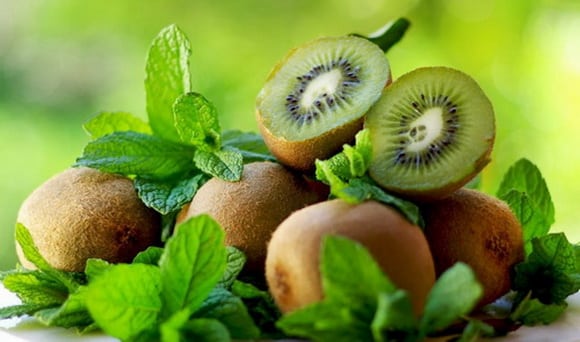
Kiwi Masks
Vitamins, which the fetus is rich in, promote collagen production, renew cells, cleanse pores, improve blood circulation, and eliminate inflammation.To rejuvenate aging skin, kiwi pulp is mixed with the same amount of bee honey. The mass is applied to the face, after 20 minutes, washed off with water.
A mask made from crushed half of the fruit and crude protein helps to narrow pores, eliminate oily sheen. To soften and moisturize dry skin, kiwi is sent to a blender, after which it is combined with sour cream and honey, applied for 15 minutes.
Pulp peeling
To get rid of blackheads, cleanse the face, bones and core are removed from kiwi and mixed with kefir. The mass must be squeezed out, applied to the skin in a thick layer, after rinsing, wipe with milk. This peeling evens out the shade and tightens the pores.
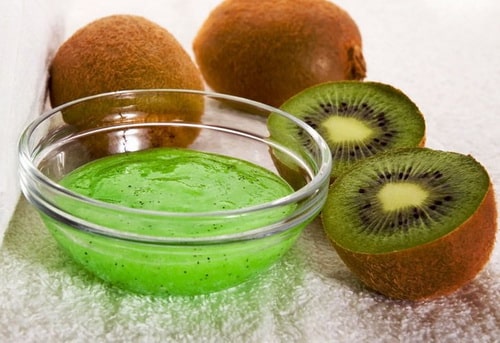
You can moisturize fabrics, remove comedones by combining cottage cheese with kiwi juice. The mixture is applied to problem areas, gently massaging. After 15 minutes, it is removed with a swab, along with which the softened plugs come off, dirt and sebum are pulled out.
Can I use
Is it useful for everyone to eat kiwi, people with health problems, women who are carrying a child, nursing mothers are interested.
With diabetes
Although the fruits of the tree liana contain sugar, they also contain enzymes that help eliminate toxins, burn fat, speed up metabolism, and fiber regulates the amount of glucose. Doctors believe that kiwi can and should be consumed for any type of diabetes.
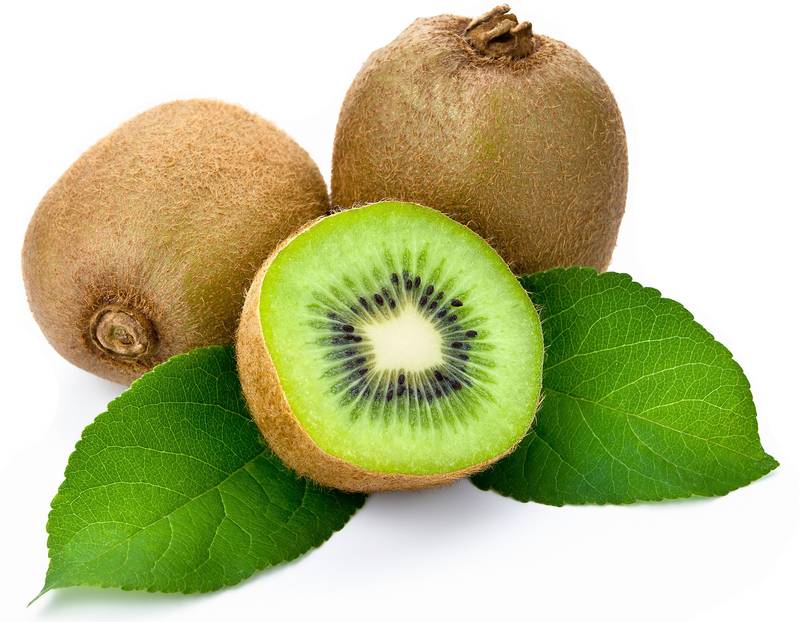
During pregnancy and breastfeeding
Folic acid reduces the risk of miscarriage, promotes the mental development of the baby, and prevents the appearance of defects in the nervous system. Doctors not only allow pregnant women to eat kiwi, but also advise to eat not one, but 2 or 3 fruits, since they are rich in folic acid.
Vitamin C, contained in berries, strengthens the walls of blood vessels, iron copes with anemia, magnesium prevents the development of oxygen starvation in the fetus.Kiwi improves appetite, relieves symptoms of toxicosis. You need to carefully and little by little to introduce the berries of a tree-like liana into the baby's diet. Until the baby is 6 months old, it is better for mom not to risk the health of the baby by eating exotic fruit.
Harm and contraindications
Kiwi should not be consumed by people suffering from allergies or prone to such a disease. Fruits should not be eaten with stomach ulcers, gastritis, since they contain a lot of organic acids that can irritate the mucous membrane.
With excessive passion for an exotic berry:
- a rash forms;
- the skin turns red;
- tormented by vomiting and nausea;
- face swells.
With an excess of potassium and vitamins, dermatitis develops, the pancreas suffers, digestion is disturbed, but such phenomena occur extremely rarely.
